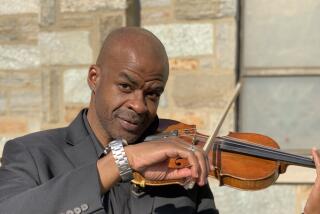KLEZMER MUSIC LEADS VIOLINIST ON ODYSSEY
SAN DIEGO â âA wedding without klezmer is worse than a funeral without tears.â
--Eastern European Jewish proverb
Over the past decade, the revival of klezmer music has made it a fashionable ornament to Jewish weddings and bar mitzvahs, as well as the occasional concert stage. But few American performers of this once-thriving Eastern European musical tradition can match Yale Stromâs boast of having played a Jewish wedding with authentic klezmer musicians in rural Romania.
âThat was a real high for me,â said Strom. âThey were surprised that I could play pretty well. To jam with those Gypsy musicians was great.â
When the San Diego violinist recounted his experiences during a three-month sojourn in 1981 to discover the remaining traces of klezmer traditions in the Soviet Union, Czechoslovakia and Romania, his usual brisk conversational pace quickened. Strom explained that although klezmer music has medieval roots and flourished during the last century, 20th-Century urbanization and World War II nearly destroyed it.
Stromâs 1981 trip and two later Eastern European forays were adventures that have shaped the career of the budding 29-year-old musician and photographer. His travels have provided him with the musical materials for his klezmer band, which he calls Zmiros, a Hebrew term that means âSabbath table melodies.â And the photographs he and his associate Brian Blue have taken of Jewish life behind the Iron Curtain formed the basis of their first book, âThe Last Jews of Eastern Europe,â which was published last year by New Yorkâs Philosophical Library press. According to Strom, the volume will go into its second printing this July.
Local fans of Zmiros can hear the group play Sunday evening at Words and Music bookstore in Hillcrest. In addition to Strom, the group is composed of guitarist Fred Benedetti, bassist Jeff Pekarek and clarinetist Robert Zelickman. They will be joined by Debbie Davis, who sings Yiddish folk melodies, and guitarist George Svoboda, who will play, with Benedetti, Stromâs most recent composition, âHora din Caval.â
Trained as a classical violinist, Strom played in the local youth symphony orchestra and pursued a traditional musical education at San Diego State University. It was not until he spent his junior year at Swedenâs University of Uppsala that he became interested in the folk music of other cultures. And it was at Sushi, San Diegoâs performance art mecca, that he encountered klezmer music during a dance played by Ron Robboyâs Big Jewish Band.
âI came from a traditional Jewish home, but hearing that group brought me face to face with the traditions I had grown up with and never paid any attention to,â said Strom. Once he was bitten by the klezmer bug, plans to go to law school were replaced by his European research trip. âWhen I decided to form my own band, I didnât want to play the same music everyone else was playing. I wanted to get music that wasnât available in the stores or on old 78 recordings. I knew I needed to get to the original sources.â
Stromâs playing not only won the confidence of musicians in remote Jewish settlements, but it also got him out of political hot water. When he and Blue were crossing the Polish border into Czechoslovakia in the winter of 1985, what they thought were only minor visa problems lead to incarceration. The Polish authorities became suspicious that the two purported tourists had extensive photographic and recording equipment in their backpacks.
âWhen Brian and I were in the hoosegow, we literally played our way out. He played a little guitar, so we serenaded the guards with some American folk music and then some klezmer tunes. After that, I guess they decided that we really were harmless musicians.â Not only were the two released, but all of the rolls of film they had shot of Jewish life in the Soviet Union were returned to them unharmed.
The photographs of Jewish life Blue and Strom took were exhibited last year at Chicagoâs Sperdis Museum, and, naturally, Zmiros performed at the exhibitâs opening. The show continues to travel, and will open in September in Miami.
This summer Strom will go to eastern Hungary with PBS documentary director Oren Rudavsky to do the initial filming of rural Jewish life for public television.
More to Read
The biggest entertainment stories
Get our big stories about Hollywood, film, television, music, arts, culture and more right in your inbox as soon as they publish.
You may occasionally receive promotional content from the Los Angeles Times.










